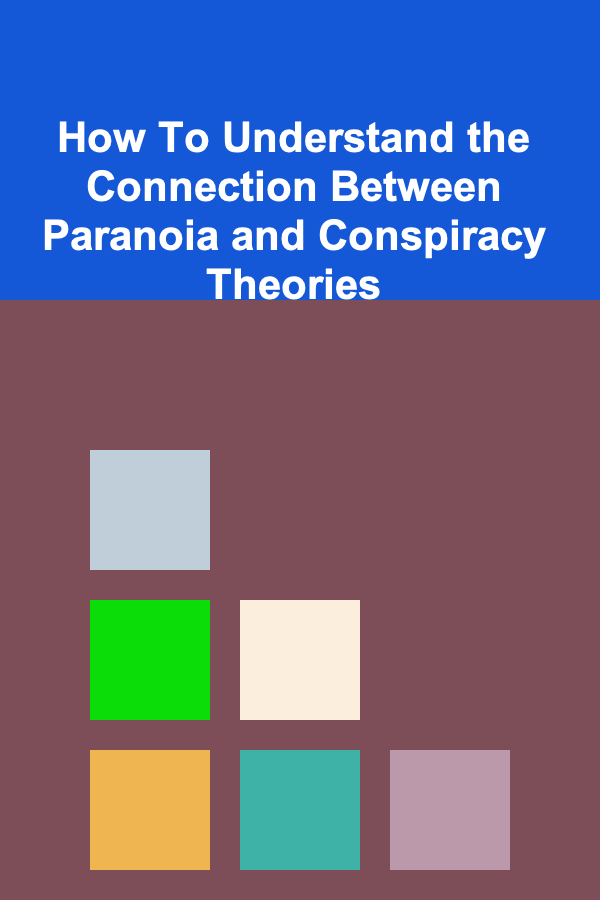
How To Understand the Connection Between Paranoia and Conspiracy Theories
ebook include PDF & Audio bundle (Micro Guide)
$12.99$5.99
Limited Time Offer! Order within the next:

Paranoia and conspiracy theories are two psychological phenomena that often intersect, influencing how individuals perceive the world around them. These concepts can seem abstract and disconnected at first glance, but when analyzed together, they offer profound insights into human cognition, social behavior, and the ways in which individuals process information in an increasingly complex world.
In this article, we will explore the connection between paranoia and conspiracy theories, delving into their psychological underpinnings, societal contexts, and the ways in which they influence individual and collective perceptions. By understanding this relationship, we can better navigate the modern world, where misinformation and distrust are prevalent, and recognize the impact of these psychological phenomena on our personal and collective realities.
Defining Paranoia
Paranoia, in its simplest form, can be understood as a psychological state characterized by irrational and excessive fear or suspicion that others are plotting against, spying on, or trying to harm the individual. This condition often leads to a distorted sense of reality, where the person believes that ordinary events or interactions are part of a larger, hidden agenda. While paranoia can exist as a symptom of various mental health conditions, such as schizophrenia, it can also manifest in more everyday forms, affecting individuals who might otherwise be considered psychologically healthy.
Paranoia can vary in intensity, from mild feelings of suspicion to full-blown delusional thinking. In more severe cases, it may lead to behaviors such as social withdrawal, increased vigilance, or even aggression toward perceived threats. It often stems from a perceived lack of control over one's environment and the belief that the world is inherently dangerous or hostile.
What Are Conspiracy Theories?
Conspiracy theories are explanations of events or situations that invoke a secret, often sinister, plot by a group of people, organizations, or governments. These theories typically challenge the official or widely accepted narrative, offering an alternative explanation that suggests hidden forces at work. Conspiracy theories can cover a broad range of topics, from political events and scientific phenomena to cultural and historical occurrences.
A defining characteristic of conspiracy theories is that they suggest the existence of a hidden truth that is being deliberately suppressed. Followers of these theories often believe that mainstream institutions, such as the media, government, or academic bodies, are actively covering up this truth to maintain control or achieve their own agendas. As such, conspiracy theories often involve a sense of distrust toward authority and a belief that the "real" story is being obscured from the public.
Psychological Factors Behind Paranoia and Conspiracy Theories
While paranoia and conspiracy theories may seem like distinct concepts, they share several psychological mechanisms. Both involve a heightened sense of suspicion, a tendency to attribute malicious intent to others, and a desire to explain seemingly random or unexplained events in terms of deliberate actions by powerful individuals or groups.
1. Need for Control
One of the primary psychological drivers of both paranoia and conspiracy theories is the need for control. Human beings have an innate desire to make sense of their environment and understand the forces that shape their lives. When individuals feel that they lack control over their circumstances---whether due to personal experiences, societal changes, or global events---they may seek alternative explanations that offer a sense of agency.
Conspiracy theories provide an easy way to explain complex or chaotic events by attributing them to deliberate actions by powerful groups. This offers individuals a sense of clarity and control over situations that may otherwise seem random or overwhelming. Paranoia, similarly, arises when individuals feel that they are being targeted or manipulated by others, which provides a sense of explanation and control over their experiences.
2. Cognitive Biases
Both paranoia and conspiracy theories are influenced by various cognitive biases that shape how we process information. One of the most relevant biases is the confirmation bias, which occurs when individuals seek out information that supports their preexisting beliefs while ignoring or dismissing information that contradicts them. This bias can lead individuals to gravitate toward conspiracy theories that align with their suspicions or fears, reinforcing their worldview and increasing their sense of paranoia.
Another cognitive bias at play is the illusory pattern perception, which is the tendency to perceive patterns in random or unrelated events. When individuals are faced with ambiguous or confusing situations, they may create narratives that connect disparate events, often resulting in conspiracy theories. Paranoia can similarly emerge from this bias, as individuals may see hidden threats or malevolent forces where none exist.
3. Social Influence and Echo Chambers
Paranoia and conspiracy theories are often amplified by social influences and group dynamics. In today's interconnected world, social media and online communities play a significant role in spreading conspiracy theories. These platforms create echo chambers, where individuals are exposed only to information that aligns with their beliefs, reinforcing their suspicions and creating a sense of solidarity with others who share their views.
In such echo chambers, conspiracy theories can take on a life of their own, with individuals constantly reinforcing one another's beliefs and increasing their sense of paranoia. This groupthink phenomenon can lead to the entrenchment of false beliefs, as individuals become more convinced of the truth of their conspiratorial worldview and less open to alternative explanations.
4. Paranoia as a Coping Mechanism
For some individuals, paranoia may serve as a coping mechanism in response to feelings of powerlessness, trauma, or anxiety. In a world that can often feel unpredictable or threatening, believing that there is a deliberate force behind negative events may offer a sense of understanding and control. Similarly, conspiracy theories can provide a framework for making sense of personal or societal upheavals, offering a narrative that explains why certain things are happening and who is responsible for them.
While this coping mechanism can provide temporary relief, it can also be harmful, as it leads individuals to distrust others, isolate themselves, and become fixated on false or distorted narratives.
How Paranoia Fuels Conspiracy Theories
The relationship between paranoia and conspiracy theories is often cyclical: paranoia fuels belief in conspiracy theories, and conspiracy theories, in turn, reinforce feelings of paranoia. This cycle can be particularly damaging, as it leads individuals further down a rabbit hole of suspicion and mistrust.
For example, an individual who is prone to paranoia might interpret a neutral or ambiguous event as evidence of a conspiracy. If they are already suspicious of the government, for instance, they might believe that a new law or policy is part of a larger, covert agenda to control the population. This belief feeds their paranoia, causing them to search for more evidence that supports their theory and leading them to dismiss contradictory information as part of the conspiracy.
Over time, this process can result in a deeply entrenched belief in conspiracy theories, which further intensifies the individual's paranoia. As their worldview becomes more distorted, they may begin to see conspiracies everywhere, interpreting even ordinary events as part of a grand, hidden plan. This can lead to increased social isolation, distrust, and anxiety, as the individual becomes consumed by their belief in the conspiracy and their fear of being targeted by those they believe are orchestrating it.
Societal and Cultural Influences
Paranoia and conspiracy theories do not exist in a vacuum; they are shaped by societal and cultural contexts. In times of political instability, economic uncertainty, or social unrest, conspiracy theories are more likely to flourish. When individuals feel that their world is becoming unpredictable or threatening, they may be more inclined to seek out explanations that offer a sense of security, even if those explanations are based on unfounded or exaggerated beliefs.
Cultural factors, such as the level of trust in institutions, media, and authority figures, also play a significant role in the spread of paranoia and conspiracy theories. In societies where there is a high level of distrust toward the government, the media, or scientific institutions, individuals may be more likely to embrace alternative explanations for events. The proliferation of misinformation and fake news in the digital age further exacerbates this issue, as individuals can easily access and share content that supports their conspiratorial beliefs.
The Impact of Paranoia and Conspiracy Theories on Society
The widespread belief in conspiracy theories, fueled by paranoia, can have significant consequences for individuals and society as a whole. On a personal level, individuals who are deeply entrenched in conspiratorial thinking may experience increased anxiety, stress, and social isolation. Their relationships with others may suffer, as they become more suspicious and distrustful of those around them. In some cases, individuals may even engage in harmful behaviors, such as withdrawing from society or taking extreme actions to "fight" the conspiracy they believe in.
On a societal level, the proliferation of conspiracy theories can undermine social cohesion and trust. When large segments of the population embrace false or distorted narratives, it becomes more difficult for society to function effectively. The spread of misinformation can lead to division, polarization, and a breakdown in collective problem-solving, making it harder to address real-world issues.
1. Erosion of Trust in Institutions
One of the most significant societal impacts of paranoia and conspiracy theories is the erosion of trust in institutions. When individuals believe that the government, media, or scientific community is deliberately hiding the truth, they may become less likely to engage with or support these institutions. This can lead to a breakdown in social cohesion, as people become more isolated and distrustful of each other.
2. Polarization and Social Fragmentation
Conspiracy theories often thrive in polarized environments, where individuals feel that their views are under attack or that they are being manipulated by powerful forces. As these theories spread, they can contribute to further polarization, with different groups forming around competing beliefs and narratives. This fragmentation can make it more difficult to reach consensus on important societal issues, as people become increasingly entrenched in their divergent worldviews.
Conclusion
The connection between paranoia and conspiracy theories is complex and multifaceted. While paranoia can fuel belief in conspiracy theories, conspiracy theories, in turn, can reinforce feelings of paranoia. Both phenomena are shaped by psychological factors such as the need for control, cognitive biases, and social influences. Additionally, societal and cultural contexts play a significant role in the spread and entrenchment of conspiratorial thinking.
By understanding the psychological underpinnings of paranoia and conspiracy theories, we can better navigate the challenges posed by misinformation, mistrust, and social fragmentation in the modern world. Addressing these issues requires a multifaceted approach, including promoting critical thinking, improving media literacy, and fostering trust in institutions. Ultimately, by understanding the dynamics of paranoia and conspiracy theories, we can work toward a more informed and cohesive society, where individuals are better equipped to navigate the complexities of the modern world without resorting to distorted or harmful narratives.

Generating Passive Income with AI-Powered Automation Tools
Read More
How to Conduct a Home Security Assessment
Read More
How to Protect Earth from Asteroids
Read More
How to Use Floor-to-Ceiling Windows to Maximize Daylight in Your Home
Read More
How to Use Online Gaming to Make Money
Read More
Self-Care: Nurturing Yourself for a Healthy and Happy Life
Read MoreOther Products

Generating Passive Income with AI-Powered Automation Tools
Read More
How to Conduct a Home Security Assessment
Read More
How to Protect Earth from Asteroids
Read More
How to Use Floor-to-Ceiling Windows to Maximize Daylight in Your Home
Read More
How to Use Online Gaming to Make Money
Read More